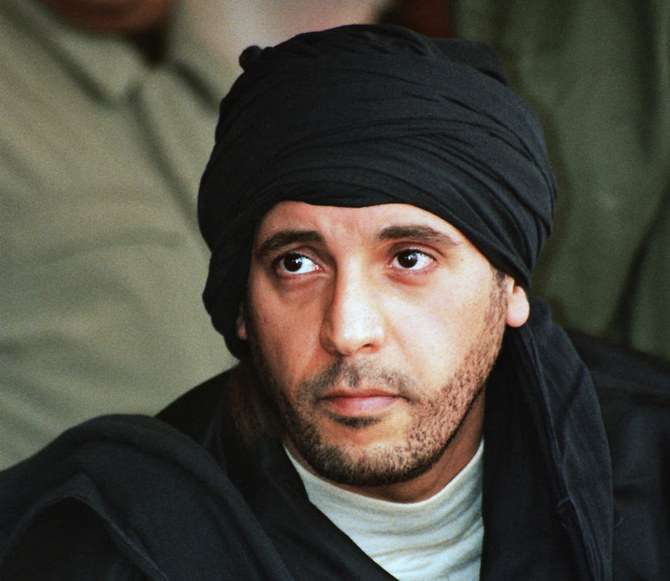BEIRUT: A Libyan delegation visited Beirut this week to reopen talks with Lebanese officials on the fate of a prominent Lebanese cleric who has been missing in Libya for decades, and on the release of late dictator Muammar Qaddafi’s son who has been held in Lebanon for years, officials said.
The talks were aimed at reactivating a dormant agreement between Lebanon and Libya, struck in 2014, for cooperation in the probe of the 1978 disappearance of Shiite cleric Moussa Al-Sadr, judicial and security officials said.
The fate of the cleric has been a long-standing sore point in Lebanon. His family believes he may still be alive in a Libyan prison, though most Lebanese presume Al-Sadr, who would be 94 now, is dead.
The late Libyan ruler’s son Hannibal Qaddafi has been held in Lebanon since 2015 after he was kidnapped from neighboring Syria, where he had been living as a political refugee. He was abducted by Lebanese militants demanding information about the fate of Al-Sadr.
Lebanese authorities freed him but then detained him, accusing him of concealing information about Al-Sadr’s disappearance.
A legal official familiar with the case said the Libyan delegation left Beirut after spending several days in Lebanon, where they met with the minister of justice and a judge heading a committee investigating Al-Sadr’s disappearance.
The official described the talks as “positive” but did not elaborate or say if they achieved any results. The delegation is expected to return next week, he said, and added that Lebanese and Libyan authorities are treating the two cases as separate.
He said “there is no deal” so far for Qaddafi’s release.
All the officials spoke on condition of anonymity because they were not authorized to talk to reporters.
The Libyan delegation’s visit was not publicly announced by either Lebanon or Libya. Libya’s internationally recognized government, seated in Tripoli, did not immediately respond to a request for comment.
Al-Sadr was the founder of the Amal group, a Shiite militia that fought in Lebanon’s 1975-90 civil war and later became a political party, currently headed by the country’s powerful Parliament Speaker Nabih Berri.
Many of Al-Sadr’s followers are convinced that Muammar Qaddafi ordered Al-Sadr killed in a dispute over Libyan payments to Lebanese militias. Libya has maintained that the cleric, along with two traveling companions, left Tripoli in 1978 on a flight to Rome.
Last August, Libya’s judicial authorities formally asked Lebanon to release Hannibal Qaddafi because of his deteriorating health after he went on a hunger strike in June and was hospitalized several times.
Human Rights Watch this month issued a statement calling for Qaddafi’s release. The rights group noted that Qaddafi was only 2 years old at the time of Al-Sadr’s disappearance and held no senior position in Libya as an adult.
Qaddafi’s “apparent arbitrary detention on spurious charges after spending eight years in pretrial detention makes a mockery of Lebanon’s already strained judicial system,” Hanan Salah, the group’s associate Middle East and North Africa director, said in a statement.
“It’s understandable that people want to know what happened,” Salah said. “But it is unlawful to hold someone in pretrial detention for many years merely for their possible association with the person responsible for wrongdoing.”
A Libyan delegation reopens talks in Lebanon on a missing cleric and on Qaddafi’s detained son
https://arab.news/yj8rd
A Libyan delegation reopens talks in Lebanon on a missing cleric and on Qaddafi’s detained son

- The talks were aimed at reactivating a dormant agreement between Lebanon and Libya
- The late Libyan ruler’s son Hannibal Qaddafi has been held in Lebanon since 2015
Drone attack by paramilitary group in Sudan kills 24, including 8 children, doctors’ group says

- Saturday’s attack by RSF occurred close to the city of Rahad in North Kordofan province, said the Sudan Doctors Network
- The vehicle was transporting displaced people who fled fighting in the Dubeiker area
CAIRO: A drone attack by a notorious paramilitary group hit a vehicle carrying displaced families in central Sudan Saturday, killing at least 24 people, including eight children, a doctors’ group said, a day after a World Food Program aid convoy was targeted.
Saturday’s attack by the Rapid Support Forces occurred close to the city of Rahad in North Kordofan province, said the Sudan Doctors Network, which tracks the country’s ongoing war.
The vehicle was transporting displaced people who fled fighting in the Dubeiker area, the group said in a statement. Among the dead children were two infants.
Several others were wounded and taken for treatment in Rahad, which suffers severe medical supplies shortages, like many areas in the Kordofan region, the statement said.
The doctors’ group urged the international community and rights organizations to “take immediate action to protect civilians and hold the RSF leadership directly accountable for these violations.”
There was no immediate comment from the RSF, which has been at war against the Sudanese military for control of the country for about three years.
Sudan plunged into chaos in April 2023 when a power struggle between the military and the RSF exploded into open fighting in the capital, Khartoum, and elsewhere in the country, leaving tens of thousands dead and millions displaced.














